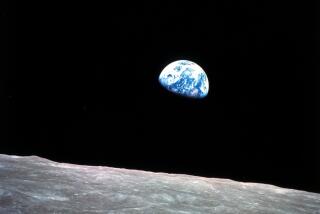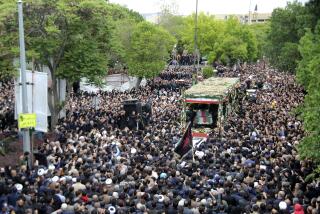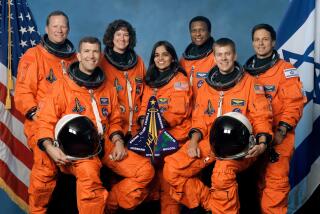U.S. Friends, Foes Share Pain of Crash
- Share via
BAGHDAD — From Iraq to Cuba, even many foes of the United States found common ground with America on Sunday, mourning the loss of the space shuttle Columbia and viewing the five men and two women who perished in the catastrophe as “brave scientists” who gave their lives for a noble purpose.
In interviews on the streets of Baghdad, most Iraqis did not hesitate to express a bond and sympathy with the astronauts who died -- among them a decorated Israeli pilot who as a young man took part in the bombing of Iraq’s nuclear reactor.
Several Iraqis volunteered that, in spite of the rising threat of a U.S.-led war against their government -- as well as the Arab world’s long-standing antipathy toward Israel -- they took no pleasure in the pain felt by Americans and Israelis after the disaster.
“As Iraqis, we respect science, and they were on a scientific mission,” said Abdul Awith, a mathematics professor passing Sunday afternoon at backgammon with a grizzled friend at the Hassan Ajami cafe on one of Baghdad’s oldest streets.
“What does it matter if it is an American or an Israeli who is killed? It is a human being,” Awith said.
“It is a very sad event,” said Ali Jabur Khassem, 37, who ekes out a living reselling canned milk and baby formula originally purchased under Baghdad’s U.N.-mandated “oil-for-food” program. “What we hate is the American administration, not these astronauts. For them, we feel respect.”
Similar views were expressed by Iraqi officials, although elsewhere in the Arab world there were also expressions of ambivalence and, occasionally, hatred.
In Jordan, an anonymous cellular telephone message went around exulting that Israel’s first man in space had been killed. A telephone store clerk, who would not give his name, blurted out when asked about the accident: “It’s OK. He [Israeli pilot Ilan Ramon] deserved it.”
Azmi Shahin, a Christian and the principal of the National Orthodox School in the Jordanian capital, Amman, said that although he felt bad for the Americans, he believed many Arabs would think of the accident as a kind of retribution by God.
“This looks like it is an act against the American government and the Israeli people -- an act by God to tell the Americans, ‘You see, you should behave in a just way toward people in the Middle East and people on Earth,’ ” Shahin said.
In Bahrain, a newspaper suggested that the tragedy could give leaders considering a war a reason to ponder the meaning and value of every life.
The disaster should “be seized by people and, more importantly, decision-makers, to indulge into deep introspection, the inevitability of death and the need to work to save lives,” said the Bahrain Tribune, a daily that closely reflects official thinking in the tiny kingdom that is home to the U.S. Navy’s 5th Fleet.
“The seven crew members were a diverse cross-cultural group, which gives us an idea of what the world can be when it works together, guided by a sense of cooperation, not confrontation, a sense of togetherness, not discrimination,” the paper said in an editorial.
In Kuwait, the news particularly touched a nerve among the large Indian expatriate population, because one of the astronauts killed was an Indian American woman, Kalpana Chawla.
“It is so sad to see. It was like a small United Nations up there,” said Showkath Ali Khan, a sunglasses salesman in Kuwait City. “... They represented a lot of hope in the world.”
One Kuwaiti feared that the crash would divert President Bush from following through with military action against Iraqi President Saddam Hussein, who invaded Kuwait in 1990.
“Now he just has another big thing to worry about,” said Salah Abdul-Rahim, a personnel manager for the national Information Ministry. “His time is very important. And now his time will be focused on this.”
Beyond the Arab world, there were near-universal expressions of regret.
In Havana, Cuban authorities put aside their profound differences with the U.S. to offer condolences and say they “share the grief and pain the American people are suffering today because of the death of some of their sons and daughters.”
Russia -- once America’s space-race rival and now its space partner -- was among the first countries to respond: President Vladimir V. Putin placed a call to Bush shortly after the accident Saturday, saying close U.S.-Russian cooperation in the international space station program added to Russians’ sense of tragedy.
“These brave people gave their lives to conquer the dangers of space in the name of peace, science and the progress of civilization. We will always remember them,” said a telegram later sent by Putin to Bush.
Said an early Russian cosmonaut, Konstantin Feoktistov, who flew to space in 1964: “They are heroes without any doubt. And the only thought that can be of any consolation to those on Earth -- if any consolation is possible at all -- is that everything happened too fast for them to realize what was going on.”
In China, which hopes to become the world’s third country to launch a person into space, President Jiang Zemin was quick to send condolences to Bush, saying he hopes space exploration will continue despite the disaster.
Beijing newspapers splashed news of the disaster across their front pages Sunday, covering it as closely as they did the return last month of China’s latest unmanned space capsule, the Shenzhou IV, which landed on the steppes of Inner Mongolia.
For years, the Chinese government has been pouring money into its efforts to join the exclusive club of nations that have sent humans into orbit. Chinese “taikonauts” are preparing for a possible space mission this year.
The disaster was the top story for all major newspapers and networks in Japan, which saw the tragedy as a significant blow to its space program.
Japanese astronaut Soichi Noguchi, 37, was scheduled to fly aboard the Atlantis on NASA’s next mission to the space station, March 1. But that trip is on hold pending the results of the U.S. crash investigation.
Mamoru Mohri, 55, who flew on the Endeavour in 1992 as Japan’s first astronaut, said space exploration must go ahead.
“The loss of life is a horrible thing,” he told government broadcaster NHK. “But space development is important enough that we must overcome it. It is our destiny to go to Mars, to go beyond Earth.”
*
Times staff writers Henry Chu in Beijing, David Holley in Moscow, Sam Howe Verhovek in Kuwait, Mark Magnier in Tokyo, Alissa J. Rubin in Amman and Carol J. Williams in Havana, along with Alexei V. Kuznetsov of The Times’ Moscow Bureau, contributed to this report.
More to Read
Sign up for Essential California
The most important California stories and recommendations in your inbox every morning.
You may occasionally receive promotional content from the Los Angeles Times.













